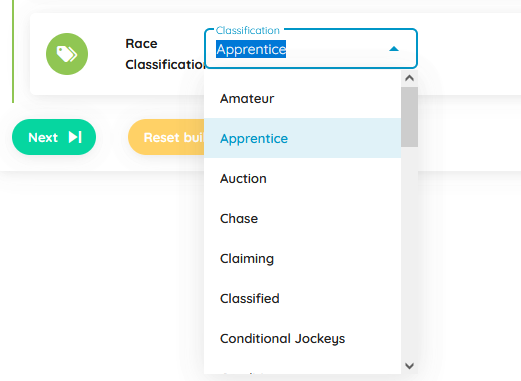The BTC Horse Racing Thread
-
@john-folan Got to be, there was always gold in that naps table - variance killed most people using it.
-
@ryan said in The BTC Horse Racing Thread:
I am wondering if theres something we can do with the pace and the Racing Post Naps table.
It used to be total gold, any -25 were worth a lay, this back in the day was one of the criteria for my lays.
I bet there is.
-
@ryan said in The BTC Horse Racing Thread:
@john-folan Very close, I am on these. Maybe its me, maybe I am the curse after that great month last month!
Nope they do this. No such thing as a jinx!
-
@john-folan Very close, I am on these. Maybe its me, maybe I am the curse after that great month last month!
-
Flat Pace had another close second yesterday. Keeps knocking!
Another quiet day
Flat Pace. Back to Win if between 2.0-25.0. 4-14 Runners only. Avoid Soft, Heavy and Firm Going

-
@jonathan-jones said in The BTC Horse Racing Thread:
Sorry, got another one.
In the filter 'Classifications' is a simple select and not a multi-select. Any reason why its like this? seems like the sort of thing a multi-select is more suited for.The reason is that the race classifications all appear in one big string, which we then have to parse and do a load of partial text matching. It results in a ton of false positives to do "any of this list in any of that list".
The upside about the way it's done now is that you can group them and apply different operators, e.g. "look for novice chases, but not grade 1 ones".
-
Just a suggestion but for the bet placement and stake, on the lay side is there any way we could have a 'stake as liability' option? Its pretty much standard on all the trading tools i have seen so makes sense to add it.
-
@greg-mitchell said in The BTC Horse Racing Thread:
@Keith Well there you go, who knew you had to press enter, I was just typing the new name and mouse clicking...
yeah this is actually a good point @Adam any way to enable a click away from the text to work how it usually would on other things?
-
@keith said in The BTC Horse Racing Thread:
@greg-mitchell said in The BTC Horse Racing Thread:
@Keith Well there you go, who knew you had to press enter, I was just typing the new name and mouse clicking...
Glad you got it sorted mate. I think I originally had a few attempts myself in the beginning so don't feel too bad on yourself

All done this.



-
@greg-mitchell said in The BTC Horse Racing Thread:
@Keith Well there you go, who knew you had to press enter, I was just typing the new name and mouse clicking...
Glad you got it sorted mate. I think I originally had a few attempts myself in the beginning so don't feel too bad on yourself

-
@Keith Well there you go, who knew you had to press enter, I was just typing the new name and mouse clicking...
-
@greg-mitchell said in The BTC Horse Racing Thread:
Not sure I've put this in the right place, but after some help with the Horse Racing Software, I am having trouble renaming my Strategies, I create a new one, it gives it the default name, I rename it to whatever, but it still displays the default name it gave me originally, but if I then click on it to edit the name, it shows the new name that I gave it?
Hope that makes sense!
After I rename a strategy I just press enter and it renames it correctly? Have you submitted a support ticket to @Adam ?
-
Not sure I've put this in the right place, but after some help with the Horse Racing Software, I am having trouble renaming my Strategies, I create a new one, it gives it the default name, I rename it to whatever, but it still displays the default name it gave me originally, but if I then click on it to edit the name, it shows the new name that I gave it?
Hope that makes sense!
-
@john-folan
Cheers,
There isnt many anyway so that workaround is fine. -
@jonathan-jones said in The BTC Horse Racing Thread:
Sorry, got another one.
In the filter 'Classifications' is a simple select and not a multi-select. Any reason why its like this? seems like the sort of thing a multi-select is more suited for.
Ah I can answer that. There’s a workaround at the moment. You need to set up a separate group for classifications and add an individual rule for each one you want to exclude or include(you can have multiple instances of the same rule). It’s a bit of a pain but it locked up the server on multi selections. I’ve got it running on one of mine and it’s fine like that.
-
Sorry, got another one.
In the filter 'Classifications' is a simple select and not a multi-select. Any reason why its like this? seems like the sort of thing a multi-select is more suited for.
-
Todays
Classic Trobs: Dob, Trob or Win if odds are between 3.5-9
NONEFlat Pace. Back to Win if between 2.0-25.0. 4-14 Runners only. Avoid Soft, Heavy and Firm Going

-
@jonathan-jones We do know the BSP Favourite, 2nd Fav, 3rd Fav, as soon as the horses are off. The way to make use of those stats in the real world is to place bets between 2s to 4s after the off, which is how I handle it. You need software to do that, such as Bet Angel, BF Bot Manager, etc. Prices will not always match BSP, but they average out over the long-term.

